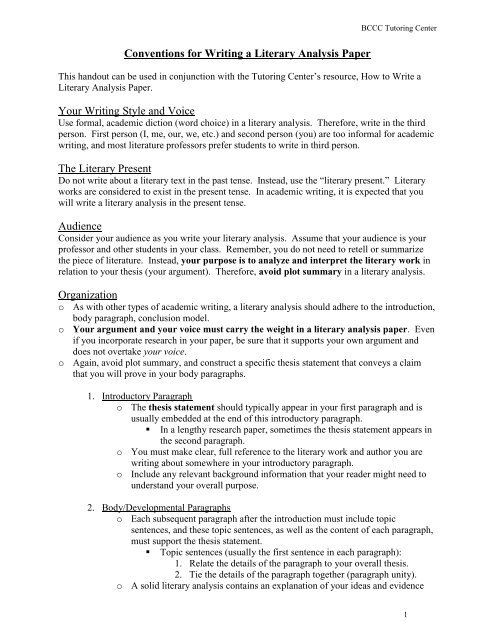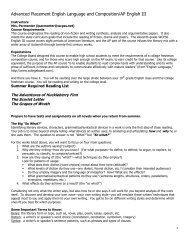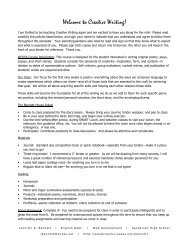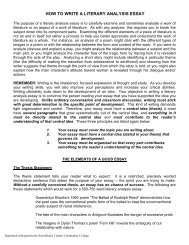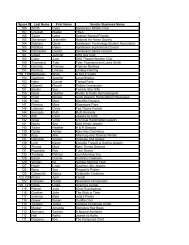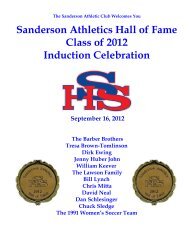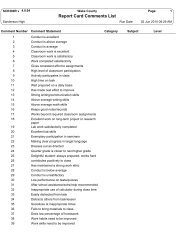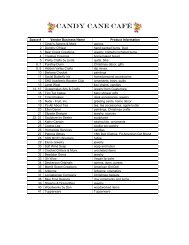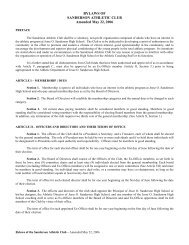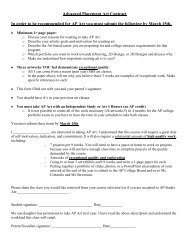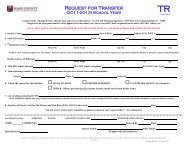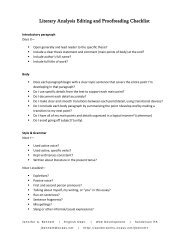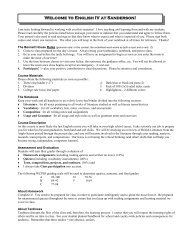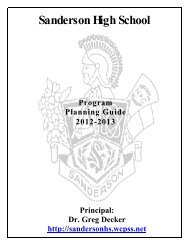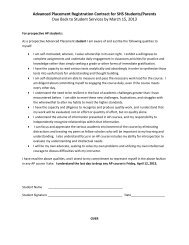Conventions of Literary Analysis - Class Folios
Conventions of Literary Analysis - Class Folios
Conventions of Literary Analysis - Class Folios
You also want an ePaper? Increase the reach of your titles
YUMPU automatically turns print PDFs into web optimized ePapers that Google loves.
<strong>Conventions</strong> for Writing a <strong>Literary</strong> <strong>Analysis</strong> Paper<br />
BCCC Tutoring Center<br />
This handout can be used in conjunction with the Tutoring Center’s resource, How to Write a<br />
<strong>Literary</strong> <strong>Analysis</strong> Paper.<br />
Your Writing Style and Voice<br />
Use formal, academic diction (word choice) in a literary analysis. Therefore, write in the third<br />
person. First person (I, me, our, we, etc.) and second person (you) are too informal for academic<br />
writing, and most literature pr<strong>of</strong>essors prefer students to write in third person.<br />
The <strong>Literary</strong> Present<br />
Do not write about a literary text in the past tense. Instead, use the “literary present.” <strong>Literary</strong><br />
works are considered to exist in the present tense. In academic writing, it is expected that you<br />
will write a literary analysis in the present tense.<br />
Audience<br />
Consider your audience as you write your literary analysis. Assume that your audience is your<br />
pr<strong>of</strong>essor and other students in your class. Remember, you do not need to retell or summarize<br />
the piece <strong>of</strong> literature. Instead, your purpose is to analyze and interpret the literary work in<br />
relation to your thesis (your argument). Therefore, avoid plot summary in a literary analysis.<br />
Organization<br />
o As with other types <strong>of</strong> academic writing, a literary analysis should adhere to the introduction,<br />
body paragraph, conclusion model.<br />
o Your argument and your voice must carry the weight in a literary analysis paper. Even<br />
if you incorporate research in your paper, be sure that it supports your own argument and<br />
does not overtake your voice.<br />
o Again, avoid plot summary, and construct a specific thesis statement that conveys a claim<br />
that you will prove in your body paragraphs.<br />
1. Introductory Paragraph<br />
o The thesis statement should typically appear in your first paragraph and is<br />
usually embedded at the end <strong>of</strong> this introductory paragraph.<br />
• In a lengthy research paper, sometimes the thesis statement appears in<br />
the second paragraph.<br />
o You must make clear, full reference to the literary work and author you are<br />
writing about somewhere in your introductory paragraph.<br />
o Include any relevant background information that your reader might need to<br />
understand your overall purpose.<br />
2. Body/Developmental Paragraphs<br />
o Each subsequent paragraph after the introduction must include topic<br />
sentences, and these topic sentences, as well as the content <strong>of</strong> each paragraph,<br />
must support the thesis statement.<br />
• Topic sentences (usually the first sentence in each paragraph):<br />
1. Relate the details <strong>of</strong> the paragraph to your overall thesis.<br />
2. Tie the details <strong>of</strong> the paragraph together (paragraph unity).<br />
o A solid literary analysis contains an explanation <strong>of</strong> your ideas and evidence<br />
1
BCCC Tutoring Center<br />
from the text for the purpose <strong>of</strong> supporting your ideas. Textual evidence<br />
consists <strong>of</strong> specific details, direct quotations, summaries, and/or<br />
paraphrases.<br />
o The substance <strong>of</strong> each <strong>of</strong> your body paragraphs will be the explanations,<br />
summaries, paraphrases, specific details, and direct quotations you need to<br />
support and develop the more general statement you have made in your topic<br />
sentence.<br />
3. Conclusion<br />
The conclusion should tie together your essay’s argument and ideas. Some<br />
approaches to the conclusion are as follows: restating the thesis (in different words)<br />
and expanding on its importance, summarizing the essay’s main points and pondering<br />
their significance, commenting on the literary work from a difference perspective.<br />
The conclusion should not introduce a new topic that has not been touched on in your<br />
essay.<br />
The Thesis Statement<br />
Remember, a literary analysis paper requires you to pose an argument and provide<br />
detailed examples from the text to support that argument. The thesis statement establishes<br />
the overall point <strong>of</strong> your essay, and it fulfills two main objectives:<br />
1. The thesis must state your topic.<br />
2. The thesis must convey what you will prove about your topic (your opinion<br />
about that topic).<br />
*The thesis statement is most <strong>of</strong>ten embedded in the introductory paragraph, usually at the end <strong>of</strong><br />
that paragraph. Occasionally, as in the below example, a thesis statement might consist <strong>of</strong> more<br />
than one sentence.<br />
According to the Simon & Schuster Handbook for Writers, the basic requirements for a thesis<br />
statement include the following:<br />
the essay’s subject—the topic that you discuss<br />
the essay’s purpose—either informative or persuasive<br />
your focus—the assertion that presents your point <strong>of</strong> view<br />
specific language—not vague words<br />
brief overview <strong>of</strong> the topic’s subdivisions<br />
(Troyka and Hesse 45)<br />
Try this strategy to develop and narrow a thesis statement.<br />
To write an effective thesis statement, start with a general idea and then sharpen your focus.<br />
Step 1: Choose a topic, e.g., the poem “Theme for English B” by Langston Hughes<br />
Step 2: Focus the topic, e.g., biographical influences in “Theme for English B,”<br />
especially the poet’s race, and how literary critics assess such influences on this<br />
poem<br />
Step 3: Narrow the topic further by posing it as a question.<br />
E.g., How do critics classify Hughes’s poems, especially those that are related to race?<br />
2
BCCC Tutoring Center<br />
How did Hughes’s experience as an African American man affect his poetry? What<br />
elements in the poem reflect Hughes’s experience as an African American man?<br />
Step 4: Answer the question. The answer is your thesis statement.<br />
E.g., Critics classify Langston Hughes’s work into poems <strong>of</strong> social and “racial protest”<br />
and poems <strong>of</strong> “racial affirmation” (DiYanni 522-523). “Theme for English B,” however,<br />
does not nestle neatly within either category, as it exudes a more complicated tone <strong>of</strong><br />
both pride and frustration.<br />
**Notice that this thesis statement proposes an argument and specifies particular literary<br />
elements that will be analyzed to help substantiate or prove the argument. This thesis statement<br />
also refers to literary critics and uses a quote from a secondary source. Be sure to ask your<br />
pr<strong>of</strong>essor if it is acceptable to do research for a literary analysis as well as if it is acceptable to<br />
refer to an outside source in the thesis statement. Doing so will depend on the parameters <strong>of</strong><br />
your specific assignment.<br />
Your thesis statement should be clear and direct and should entice your audience to read further.<br />
Each subsequent paragraph in the body <strong>of</strong> your paper should support your thesis statement and<br />
prove your claim.<br />
Proper Writing and Citation <strong>of</strong> Direct Quotations<br />
Direct quotations are one type <strong>of</strong> textual evidence that can be used to support your interpretation<br />
<strong>of</strong> a literary text.<br />
Use quotations sparingly.<br />
Remember to use quotations with discretion. Do not saturate your paper with overuse <strong>of</strong><br />
quotations. Rather, use only relevant quotations to support your ideas. Limit quoting to key<br />
statements and ideas.<br />
Integrate quotations smoothly.<br />
When you use quotations, work them into your writing as smoothly as possible. To do so, pay<br />
attention to style and punctuation. Use “signal phrases” to introduce a quotation. Never end a<br />
paragraph with a quotation. Your own interpretation or analysis should always follow a<br />
quotation. Try the “sandwich” technique. See the below formula and examples.<br />
Example 1: “Sandwiching” Quotations<br />
In her essay “The Ghosts <strong>of</strong> Ellis Island,” Mary Gordon observes, “The minute I set foot upon<br />
the island I could feel all that it stood for: insecurity, obedience, anxiety, dehumanization, the<br />
terrified and careful deference <strong>of</strong> the displaced” (392). Gordon blends her personal point <strong>of</strong> view<br />
with a historical perspective to characterize the immigrant experience <strong>of</strong> pr<strong>of</strong>ound dispossession.<br />
Work Cited<br />
Gordon, Mary. “The Ghosts <strong>of</strong> Ellis Island.” The Writer’s Presence: A Pool <strong>of</strong> Readings.<br />
3 rd ed. Ed. Donald McQuade and Robert Atwan. New York and Boston:<br />
Bedford/St. Martin’s, 2000.<br />
3
BCCC Tutoring Center<br />
1. Introduce the quote to provide context for the reader.<br />
Include the title and author if you are using the source for the first time.<br />
Use a “signal phrase” to introduce the quote (author’s name + verb).<br />
2. Direct Quote<br />
Use a direct quote when an author writes in specialized or particularly powerful<br />
language and when such textual evidence enhances your paper’s argument.<br />
Be precise. Do not use a quote from an outside source (secondary source) if it is not<br />
well written or if you can state the point more clearly in your own words. In that<br />
case, you might summarize or paraphrase the author’s ideas. If you summarize or<br />
paraphrase, you must still cite the source to credit the author.<br />
3. Your <strong>Analysis</strong> / Interpretation <strong>of</strong> the Quote<br />
Explain and discuss how the quote is significant. Relate the quote to your purpose in<br />
your paper.<br />
Demonstrate that this quote serves to make a particular point in your argument.<br />
Example 2: Student Writing<br />
The following excerpt is from Elizabeth A. Vassallo’s essay, “Protest Music <strong>of</strong> the Vietnam<br />
War: A Struggling Generation Moved to Action.” This essay was published in Fresh Ink: Essays<br />
from Boston College’s First-Year Writing Seminar 2002. Notice the organization and the use <strong>of</strong><br />
an indirect quote, as indicated by the parenthetical notation (qtd. in…).<br />
[…] Former President Bill Clinton credits Bob Dylan with “providing those who<br />
protested the Vietnam War with a moral compass as accessible to the nearest<br />
radio” (qtd. in “Voice <strong>of</strong> America”). Clearly, though, Bob Dylan did not speak<br />
for his generation on his own, but rather was aided by many other musicians who<br />
also decided that it was time to truly speak up to their contemporaries and to the<br />
world.<br />
Work Cited<br />
“Voice <strong>of</strong> America: At 60, Bob Dylan Is Still His Generation’s Troubadour.” Editorial.<br />
Pittsburgh-Post Gazette (23 May 2001): A-24.<br />
Important Notes:<br />
Prose quotations longer than four lines should be set <strong>of</strong>f in block quotes, indented 10<br />
spaces from the left margin and double spaced, without quotation marks.<br />
Poetry quotations longer than three lines should be set <strong>of</strong>f in block quotes, centered and<br />
double spaced, without quotation marks. Indicate page numbers for prose and line<br />
numbers for poetry. See The MLA Handbook for Writers <strong>of</strong> Research Papers by Joseph<br />
Gibaldi for more information on properly citing sources and correct formatting <strong>of</strong><br />
citations.<br />
If you have questions about citing sources, ask them before turning in your paper.<br />
Ideally, make an appointment to see your instructor and/or a Writing Tutor.<br />
4
BCCC Tutoring Center<br />
Your Essay’s Title<br />
Be sure to give your literary analysis essay a title. The title should be indicative <strong>of</strong> your essay’s<br />
approach or perspective on the literary text. Do not use the title <strong>of</strong> the literary work as the title <strong>of</strong><br />
your paper. Consult the MLA Handbook (or any writing or grammar handbook) for information<br />
on proper capitalization and punctuation <strong>of</strong> titles.<br />
Proper Formatting for Titles <strong>of</strong> <strong>Literary</strong> Works and Other Media<br />
Use the correct format for referring to the work you are discussing. The titles <strong>of</strong> short stories,<br />
poems, and essays should be placed in quotation marks. The titles <strong>of</strong> novels, plays, films, and<br />
TV shows should be either underlined or italicized:<br />
"My Last Duchess"<br />
Antigone<br />
"The Secret Lion"<br />
Forest Gump<br />
Pride and Prejudice<br />
The Simpsons<br />
(poem)<br />
(play)<br />
(short story)<br />
(movie)<br />
(novel)<br />
(TV show)<br />
Differentiation Between Speaker and Author<br />
Often in literature, the speaker is not the author. One aspect <strong>of</strong> literary analysis entails exploring<br />
the relationship between author and speaker. Carefully analyze point <strong>of</strong> view and tone.<br />
Consider the author’s intended meaning; however, do not mistake the opinions <strong>of</strong> the narrator for<br />
those <strong>of</strong> the writer.<br />
5
BCCC Tutoring Center<br />
<strong>Literary</strong> <strong>Analysis</strong> Checklist<br />
1. Is the topic you have chosen to write about manageable for the length <strong>of</strong> the paper you<br />
are writing? Is the topic too narrow or too broad?<br />
2. Is your title engaging? Does it suggest the approach you are taking in your paper?<br />
3. Does your first paragraph introduce your topic, name the writer and the work, and end<br />
with your thesis statement? Will it get the reader's attention?<br />
4. Is your thesis clear? Does it state the central idea <strong>of</strong> your paper and make a<br />
claim (state an opinion) that you will prove in your body paragraphs?<br />
5. Is your paper organized in a way that your reader will be able to follow?<br />
6. Are your developmental paragraphs unified (everything in the paragraph relates to the<br />
topic <strong>of</strong> the paragraph) and coherent (everything in the paragraph is arranged in a logical<br />
order)?<br />
7. Do all <strong>of</strong> your body paragraphs support your thesis and further your argument?<br />
8. Have you used transitional words where necessary within each paragraph? Are there<br />
transitions linking all the paragraphs <strong>of</strong> your essay and indicating the direction <strong>of</strong> your<br />
thinking?<br />
9. Have you used literary terms correctly?<br />
10. Have you used brief summary, paraphrase, specific details, and direct quotations as<br />
evidence to support your claims? Have you explained how these details support your<br />
central idea?<br />
11. Have you correctly formatted, punctuated, and cited (according to MLA<br />
Style) all summaries, paraphrases, and quotations? Have you included the required<br />
Works Cited page? Does every in-text citation have a corresponding entry on the Works<br />
Cited page?<br />
12. If you have used information from sources outside the actual work <strong>of</strong> literature (for<br />
example, books <strong>of</strong> criticism), have you properly documented this information? To<br />
provide documentation for literary papers, you need to use MLA documentation style,<br />
which can found in most writing handbooks and in books on how to write research<br />
papers, as well as an additional Tutoring Center handout. The MLA Handbook for<br />
Writers <strong>of</strong> Research Papers by Joseph Gibaldi is the authoritative text on MLA<br />
documentation.<br />
13. Does your concluding paragraph provide a sense <strong>of</strong> closure and tie together your ideas?<br />
14. Have you carefully pro<strong>of</strong>read your final draft for content, style, grammar, and<br />
mechanics?<br />
6


